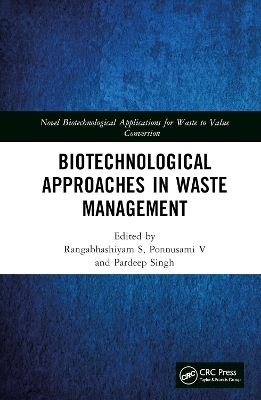
Biotechnological Approaches in Waste Management
CRC Press (Verlag)
978-1-032-03629-8 (ISBN)
Waste generation from industrial and domestic sectors is imposing a very challenging environment and the intervention of biotechnology offers a viable solution for their effective management. This book deals with the employment of biotechnological aspects for waste treatment including the basic concepts, biochemical processes, and various technologies for pollutant reduction and production of value-added products for a cleaner environment. It covers different aspects of biotechnology in the conservation of environment dealing with the sustainable management of waste through the concept of waste-to-economy along with the management of environmental pollutants and natural resource conservation.
Focuses on ecological approaches i.e., the use of biocatalysts and biotechnological approaches for waste management
Explores the different biotechnology-based solutions for the removal of environmental pollutants
Covers various microbiological routes, technological options for waste to energy, removal of contaminants, and the production of value-added products
Reviews the bioremediation potential of microbial strains and enzymes
Explores the significant routes of biotechnological means of obtaining eco-friendly products substituting the hazardous chemical-based products
This volume is aimed at researchers and professionals in environmental, biotechnology, and chemical engineering.
Rangabhashiyam S is currently working as Assistant Professor in the School of Chemical and Biotechnology, SASTRA Deemed University, India. He received his Doctor of Philosophy degree from National Institute of Technology Calicut, India. He has received Post-Doctoral Fellowship from Max Planck Institute for Dynamics of Complex Technical Systems, Germany, received National-Post Doctoral Fellowship from SERB-DST, India, selected as Young Scientist by DST, India for the BRICS Conclave held in Durban, South Africa and received Hiyoshi Young Leaf Award from Hiyoshi Ecological Services, Hiyoshi Corporation, Japan. His major research interests are bioremediation and wastewater treatment. He is Editorial Board Member in Scientific Reports, Biomass Conversion and Biorefinery, Associate Editor in International Journal of Environmental Science and Technology, IET Nanobiotechnology, Frontiers in Environmental Chemistry, Academic Editor of Adsorption Science and Technology and Editorial Board of Scientific Reports. He has published more than 90 papers and also contributed several book chapters including editing books from Elsevier and Wiley. He is listed in the World's Top 2% Scientist published by Elsevier, Stanford Ponnusami V is presently working as Associate Dean in the School of Chemical & Biotechnology, SASTRA Deemed University, India. He graduated from A. C. Tech., Anna University and did his doctoral research in SASTRA Deemed University, India. He has rich industrial and academic experience. His research interests include domestic and industrial wastewater treatment, bioconversion of lignocellulose, and bioprocessing. His group is working on photocatalysis, production of renewable fuels and microbial polysaccharides. He had published over 50 research papers in international journals. Pardeep Singh is presently working as an Assistant professor Department of Environmental Study, PGDAV College, University of Delhi, New Delhi, India. He obtained his doctorate degree from the Indian Institute of Technology (Banaras Hindu University) Varanasi. He was also selected as Young Scientist by DST, India for the BRICS Conclave held in Durban, South Africa. His research interests include waste management, wastewater treatment, water scarcity and global climate change. He has published more than 75 research/review papers in international journals in the fields of waste and wastewater treatment/management. He has also edited more than 40 books with various international publishers like CRC Press, Elsevier, Springer Nature, Wiley and IGI.
1. Bioreactors for Biomass Conversion – Solid-State Fermentation, Slurry Reactors, Airlift Reactors 2. Immobilised Enzyme Technologies for the Removal of Water Pollutants and Toxic Contaminants 3. Value-Added Products from Microalgae 4. Cleanup of Marine Oil Spills through Bioremediation Method 5. Bioreactor Scale-Up Strategies 6. Biotechnological Advancements in the Treatment of Plastic Wastes 7. Production of Biopolymer from Waste Materials as the Suitable Alternative for Plastics 8. Microbial Pigments Production Using Agricultural Biomass Residues 9. Nanotechnology-Associated Bioremediation for the Elimination of Emerging Contaminants 10. Phytoremediation Potential of Some Bioenergy Crops – A Review 11. Sustainable Approach for the Extraction of Precious Metals from Electronic Waste Materials 12. Conversion of Organic Waste to Economically Valuable Products: Recent Advancements with Challenges
| Erscheinungsdatum | 26.10.2022 |
|---|---|
| Reihe/Serie | Novel Biotechnological Applications for Waste to Value Conversion |
| Zusatzinfo | 36 Tables, black and white; 33 Line drawings, black and white; 6 Halftones, black and white; 39 Illustrations, black and white |
| Verlagsort | London |
| Sprache | englisch |
| Maße | 156 x 234 mm |
| Gewicht | 453 g |
| Themenwelt | Naturwissenschaften ► Biologie ► Ökologie / Naturschutz |
| Technik ► Bauwesen | |
| Technik ► Umwelttechnik / Biotechnologie | |
| ISBN-10 | 1-032-03629-X / 103203629X |
| ISBN-13 | 978-1-032-03629-8 / 9781032036298 |
| Zustand | Neuware |
| Haben Sie eine Frage zum Produkt? |
aus dem Bereich


